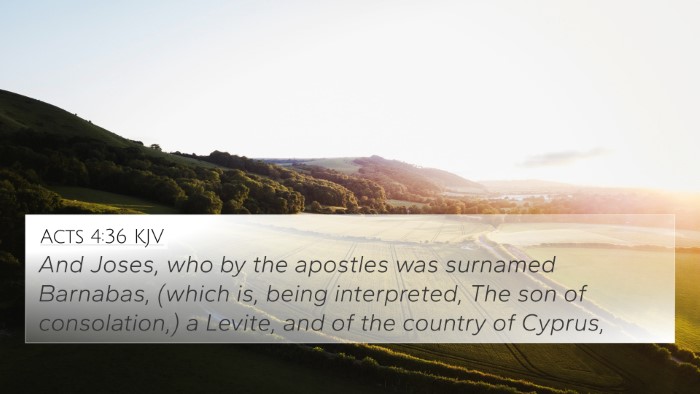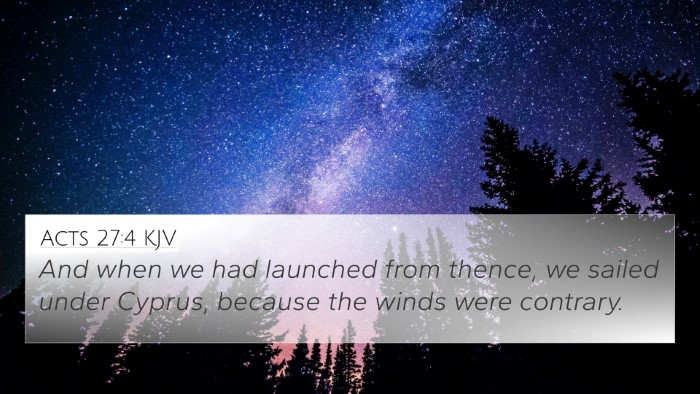Acts 13:4 states: "So they, being sent forth by the Holy Ghost, departed unto Seleucia; and from thence they sailed to Cyprus."
This passage captures a pivotal moment in the early Christian movement as it marks the beginning of Paul's missionary journeys.
Meaning and Interpretation
The directive of the Holy Spirit is central to this verse. Commentators emphasize that it illustrates the divine guidance that was present in the early church. Both Matthew Henry and Adam Clarke note that this was not merely an administrative decision but one deeply rooted in spiritual conviction and obedience to God’s call.
- Matthew Henry highlights the role of the Church in sending out its missionaries. The act of being "sent forth" carries the idea of commissioning individuals to propagate the Gospel.
- Albert Barnes points out that this early mission was vital for the church, as it set the stage for the dissemination of Christian teachings across various regions.
- Adam Clarke reflects on the geographical significance of Seleucia and Cyprus, noting they were strategic locations for spreading the Word.
Thematic Connections
This verse serves as a bridge to several other passages throughout the Bible, enriching the reader's understanding of the theme of divine mission and the role of the Holy Spirit. Here are several Bible cross-references that offer additional insights:
- Acts 1:8 - "But ye shall receive power, after that the Holy Ghost is come upon you: and ye shall be witnesses unto me..." – This establishes the role of the Holy Spirit in empowering the apostles for mission.
- Matthew 28:19-20 - The Great Commission reinforces the call to evangelism, connecting with the theme of being sent out.
- Acts 10:19-20 - Describes the guidance of the Holy Spirit in guiding missions to the Gentiles, similar to the call in Acts 13:4.
- Isaiah 49:6 - "I will also give thee for a light to the Gentiles, that thou mayest be my salvation unto the end of the earth." – This prophetic scripture finds fulfillment in the activities of Paul and Barnabas.
- Romans 10:15 - "And how shall they preach, except they be sent?" – Echoes the necessity of being sent out in the pursuit of spreading the Gospel.
- Luke 10:1 - "After these things the Lord appointed other seventy also, and sent them two and two before his face..." – This demonstrates the pattern of sending out laborers into the harvest.
- Philippians 1:5 - "For your fellowship in the gospel from the first day until now;" – This verse establishes an ongoing partnership in the spread of the Gospel.
Practical Applications
The essence of Acts 13:4 is not just history but also a practical guide for modern Christians. Here are some potential insights for today's believers:
- Active Participation: Just as the early church was involved in sending out missionaries, churches today are called to actively participate in evangelism.
- Sensitivity to the Holy Spirit: Like Paul and Barnabas, believers should seek guidance from the Holy Spirit when making decisions, especially those concerning ministry.
- Unity in Mission: The sending of Paul and Barnabas reflects the unity within the church; collaborating with fellow believers can amplify outreach efforts.
Cross-Referenced Themes
In studying this verse, we identify broader themes that interlink through both the Old and New Testaments:
- The empowerment of the Holy Spirit for mission work.
- The importance of community in evangelism, drawing from symbolism in both Acts and the Gospels.
- God's continual reach to the Gentiles, culminating in various missional passages throughout scripture.
Conclusion
Acts 13:4 stands as more than a historical account; it is a profound illustration of divine instruction and the propagation of faith across regions. By examining connections and thematic parallels in other Scriptures, believers can greatly enrich their understanding and commitment to their own missionary efforts.







